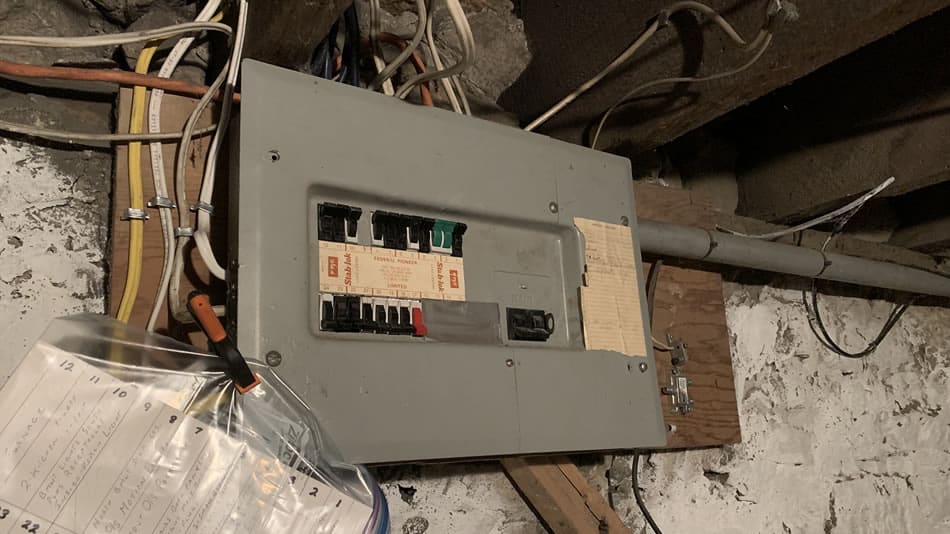
A “fishy” odour smell that is coming from your electrical panel is one smell that you do not want to ignore. Often the homeowner will try linking this fishy smell to plumbing, or an HVAC system problem, but this is a common sign of a serious electrical issue that you should take care of right away.
Most often what is happening is that the wires that are running through your walls and into the electrical panel are getting overloaded and struggling to power all of the appliances and equipment that are plugged in throughout your home.
When the electrical wires begin to significantly overheat, they will start to melt the plastic or rubber coating that is wrapped around the bare wire, which could give off a fish-like odour.
The best course of action for you to take immediately is to contact a licensed electrician right away. The electrician will be able to do a full inspection and pinpoint exactly where the problem is coming from. The electrician might also suggest that you shut off the main circuit breaker to the home to prevent the wires from overheating and starting a fire.

What Causes Electrical Components to Overheat?
Overheating is caused by a dramatic temperature increase in an electrical circuit. Here are some of the things that could cause the temperature to increase:
- Overloaded Circuit: One of the most likely causes for the temperture to increase dramatically is when the electrical component is struggling to power all of the appliances plugged-in throughout the home.
- Loose or Damaged Wires: In order for current to smoothly flow through electrical wires, there needs to be a tight connection. Loose or damaged wires will hinder the current flow which leads to overheating.
Loose or faulty wiring will cause arcing and sparking which could also cause an electrical fire. - Corrosion: Corrosion can wear wires down and cause electrical resistance, which will result in overheating.
- Incorrect Breaker/Fuse: Using the wrong size breaker or fuse with a higher amp then what it is designed to handled will cause an unsafe circuit.
Circuit breakers and fuses are designed to automatically trip and cut off the power flowing through when they reach their amp limit, this is to prevent overheating and causing an electrical fire.
If you are using a larger amp breaker or fuse, for example, using 20-amp when you should be using a 15-amp, this could cause the wires which are rated for only 15 amps of electricity to start handling 20 amps of electricity. This will cause the wires to overheat, and begin to smell like fish.
What To Do if Electrical Components Are Overheating
First and foremost, you need to call an emergency electrician right away. The longer you wait to take action, the more likely the problem is going to progress to a much more serious problem, such as burning your home down.
Only a licensed electrician should attempt to locate and fix the problem. This is not a job that you want to take on by yourself for a number of reasons. The main reason of course is that you could be electrocuted resulting in death, or possibly even end up making the problem worse and causing a fire.
A licensed electrician will be able to do a full inspection and find exactly what is causing the overheating, and they’ll be able to properly fix the problem for you.
The next thing that you can try doing is, unplugging some appliances and devices around the home. You can also try moving electrical devices to different outlets around the home to see if you can offset some of that extra current being required.
How Do You Avoid Overheating Electrical Wiring
According to Electrical Safety Foundation, there are more than 50,000 fires each year that are related to home electrical fires. Knowing the warning signs and what to look out for could help save you from becoming part of those statistics.
Now of course some things might not be in your control, such as normal wear and tear, but there are a few things that you can do to help prevent overheating electrical wiring and components.
- Limit The Number of Power Strips Being Used: Too many power stips being used on the same outlet could lead to overloading and overheating.
- Never Replace a Fuse with a Higher Amperage: If you keep tripping a fuse, you should never solve the problem by replacing the blown fuse with a higher amp fuse. Fuses are designed to shut off the power flowing through them when more amps then the wiring can handle is being used. Instead, try using a different outlet, and that still doesn’t work, consult an electrician to see if you might need a dedicated breaker for the device you are trying to power.
- Dedicate a Seperate Circuit for Large Appliances: Having your refriderator, oven, air conditioner, furnace, dishwasher, washing machine and dryer all on a seperate dedicated circuit will help limit the current flow being drawn by the appliances.
- Dispose Damaged or Frayed Electrical Cords: It is a good idea to dispose of any electrical cords that are damaged or starting to fray.
Schedule Every few years it is not a bad idea to have an electrician perform an inspection throughout your home to check the wiring and make sure that the appliances you have plugged in are not overloading the circuits.

Warning Signs of an Overloaded Electrical Component to Watch Out For
Here is a list of some of the most common things to watch out for.
- Fishy smell, or a warm burning smell coming from the plug or outlet.
- Outlet or Switch covers are warm to the touch.
- Lights dimming or flashing, especially if you are turning on or off an appliance.
- Shock or tingling feeling in your fingers when you touch an outlet, go to unplug a device or switch on or off a light switch.
- Discoloration of outlets and switches.
- If you can see smoke coming from an outlet or device.
- Cracked or broken plugs.
- Frayed or damaged cords and or wires.

